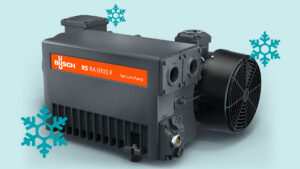Taking the Initiative on Energy-Efficiency
Mark Sowden, Marketing Manager at Wilo Salmson, considers the BPMA's new website initiative and how it helps pump specifiers meet the revised Building Regulations for England and Wales.
Legislation is a key weapon in the fight against energy inefficiency and wastage. It formalises what most of us realise is the inevitable consequence of the green revolution - cutting energy consumption not only makes ecological sense, it also makes financial sense.
Increasingly, this stance is being adopted by consumers who are demanding efficient as well as cost-effective heating and hot water systems. Today, their concerns are more likely to be about how much their heating system eats into the household budget rather than how quickly a bath can be filled with blisteringly hot water.
These concerns are justified. According to the government-funded Energy Efficiency Partnership for Homes (the Partnership), UK households waste £5 billion worth of energy annually and by adopting energy efficiency measures, could save up to £200 individually every year. More specifically, the Central Heating Information Council, an organisation that helps consumers get the best out of their central heating systems, notes that "the domestic sector is responsible for 40% of the [UK's] energy consumption and produces 25% of the carbon dioxide (C02) emissions. In turn, domestic heating and hot water account for 85% of this consumption and 50% of the C02 emissions."
Regulatory exercise
It seems that consumers are not alone in casting an eagle eye over the associated costs of energy inefficiency and wastage in domestic heating systems. In the Building Regulations for England and Wales - part LI, the Government has set a precedent by introducing strict energy efficiency requirements for replacement domestic heating boilers or hot water vessels.
"The new Building Regulations reflect the far greater importance the Government is putting on energy efficiency," the Partnership claims in a leaflet marking out the new legislation. "If you are replacing a boiler or hot water vessel, or controls or making changes to the system, you will have to demonstrate that you have carried out the work in accordance with the Regulations."
The new Building Regulations, which came into force in April 2002, have provoked revisions to the Government's Best Practice programme, which includes the Central Heating System Specifications (CHeSS) that set out best practice specifications for domestic central-heating system components. Designed to ensure that heating installations conform to current basic or best practice, one of the main objectives of the CHeSS specifications is to improve energy efficiency.
The recent revisions have been prepared with the assistance of a number of trade associations, including the British Pump Manufacturers' Association (BPMA), which provided detailed advice on selecting and installing components, including circulator pumps.
BPMA initiative
The BPMA (www.bpma.org.uk) represents the interests of UK suppliers of liquid pumps and pumping equipment by "influencing the business environment in the interests of the competitiveness and profitability". In conjunction with the CHeSS specifications, it has formulated an energy-efficiency initiative that specifically provides advice on pump specification.
With help from four of the leading UK pump manufacturers - including Wilo Salmson - the BPMA has created an interactive pump specification web site designed exclusively for domestic circulators. The bold initiative provides pump buyers with an ingenious method of selecting suitable products, including energy efficient automatic (variable speed) units and the more traditional fixed (three speed) units. Even if a traditional unit is selected the program will advise the speed to which the unit should be set. This feature alone will help address unnecessary energy wastage as many domestic circulators are either left on the speed setting that they are supplied on, or even worse, maximum speed.
The website incorporates a four-stage process during which installers select the type of property to which a pump is destined, the number of bedrooms it has, whether it has solid or filled-cavity walls and the type of heating system present. The enquiry generates an almost instantaneous on-screen list of appropriate pumps, incorporating model numbers, speed settings and manufacturers' details. For instance, an enquiry about a two-bedroom, end-terraced house with cavity-filled walls and a small-bore heating system will return seven suggested circulators, including the Wilo-Star variable-speed pump.
Renewable energy
Like taxation, legislation can be blessing in a very heavy disguise. Although it is often difficult to accept initially, it will undoubtedly provide some solace in the long run. And so it is with the Building Regulations for England and Wales - part LI and the CHeSS specifications. Although these far-reaching documents have had a huge impact on a variety of professions - none more so than pump specifiers - they should establish the framework on which a more sustainable future can be built.
The launch of the BPMA's new website initiative reflects these aims and provides specifiers with unrivalled product guidance specifically tailored to individual projects parameters. More importantly, this initiative ensures that specifiers will be able to adhere to the new regulations and reduce energy consumption.
Source: WILO SE







